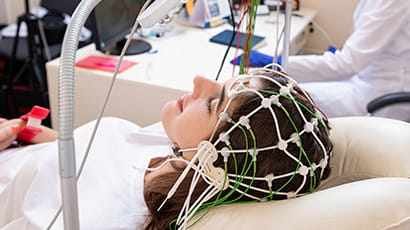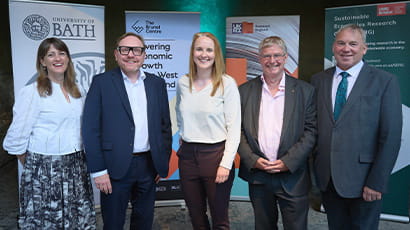Scientists develop machine that transforms dirty water into drinkable supply

Testing has begun at UWE Bristol on a portable purification system that could bring clean drinking water to areas of the world without reliable access to a safe supply.
The mini mobile treatment plant developed by scientists at the university can purify hundreds of thousands of litres of water, potentially providing a solution for one billion people around the globe.
Trials are being conducted at Frenchay Campus for three months, ahead of deployment in India next year for further testing then use by communities. Initial tests have shown the system is capable of transforming dirty water drawn from a pond into clean water meeting UK drinking water standards at a rate of 500 litres per hour.
Known as The Ninja, the 1.5m by 1.5m unit has the potential to quickly produce safe drinking water for decentralised communities or those affected by humanitarian disasters. It uses an ultra-filtration system and electrochemically activated solutions that disinfect raw water, removing biological contaminants including bacteria and viruses, as well as reducing agricultural and industrial contaminants such as nitrates, ammonia and metals.
The system is the culmination of 10 years' work, having started life as an academic research project in a small shed on campus, affectionately named Stanley by researchers. It is part of UWE Bristol's drive to make a difference on a global level with ground-breaking research.
UWE Bristol has collaborated on the project with industrial partner Portsmouth Aqua Ltd, which designs and manufactures the treatment systems.
The unit will be trialled in freshwater catchments in India as part of a UK Research and Innovation project. The project will also see UWE Bristol researchers testing the quality and health of the River Ganges using a novel V-Lux sensor developed through a partnership between UWE Bristol and Chelsea Technologies Ltd over the past 10 years. The fluorescence sensor will monitor, in real time, the microbial activity of Indian freshwater sources to determine the dirtiness of the water that local communities rely upon.
Professor Darren Reynolds, lead scientist on the project, said: "With this treatment technology, we're trying, in some small way, to help solve a big problem - that in the 21st century many people all over the world lack access to basic clean drinking water. The Ninja is an industrial-scale piece of equipment which can be easily transported overseas and used to help whole communities by producing clean, safe drinking water from dirty or contaminated sources at the touch of a button. We can even develop the system to be powered from solar panels if needed.
"Clean water should be available for everyone. Globally, at least two billion people use a drinking water source contaminated with faeces resulting in millions of deaths, mostly in children.
"Our system is capable of treating fresh water, from sources including boreholes, rivers, ponds and lakes, contaminated with bacteria and turning it into crystal clear drinking water. In three weeks on campus, we have produced 300,000 litres — enough to fill 900,000 small plastic bottles!
"The implementation of the unit in India will allow us to further understand the operating challenges associated with this technology."
The three-year, £700,000 project is a collaboration with Professor Tapan Dutta from the Bose Institute in Kolkata. It comes as India faces increasing population pressures, particularly with exponential urbanisation and industrialisation, and environmental issues.
The work forms part of the India-UK Water Quality Programme, which aims to provide policymakers, regulators, business and local communities with information and solutions that will help them secure the provision of clean water, rejuvenate rivers and restore ecosystems.
Dr Bethany Fox, a Post-Doctoral Research Scientist working on the project in India, said: "We're thrilled to be part of this prestigious international collaboration and excited to be deploying two state-of-the-art technologies that have been many years in the making at UWE Bristol. The partnership will involve the use of our UK developed technologies in India and the subsequent development of Indian inspired sensors and treatment approaches in the UK.
"It is ultimately envisaged that the outcomes from the project will provide solutions to water quality issues to local authorities, policy makers, stakeholder and local communities.
"The response from local communities in India so far to the testing has been positive — they're really pleased we are out here making the effort to understand the quality of their water."
Related news

12 December 2025
UWE Bristol’s environmentally conscious and student-focused accommodation wins three awards
Purdown View, the world's largest certified Passivhaus student accommodation development, has been recognised at Property Week Student Accommodation Awards.

25 November 2025
Health-tech start up MyCelsius launches breakthrough cooling tech for hot flushes developed at UWE Bristol’s Launch Space
A pioneering Bristol-based health-tech company developing cutting-edge cooling technology for hot flushes has credited UWE Bristol’s Launch Space incubator with playing a key role in accelerating its product development.

14 November 2025
Lecturer wins prestigious Times Higher Education award for innovation in teaching
A senior paramedic science lecturer at UWE Bristol has been named the most innovative teacher of the year in the Times Higher Education Awards 2025.

13 November 2025
Alliance Medical and UWE Bristol launch UK’s first PET-CT postgraduate certificate
In a move set to transform imaging education, Alliance Medical (AML) and UWE Bristol have joined forces to co-design and develop the UK’s first PET-CT Postgraduate Certificate (PG Cert).

13 November 2025
New AI research to revolutionise animal welfare
A UWE Bristol research project will combine behavioural science and AI to create technology that understands not only what animals do, but how they feel.

29 October 2025
UWE Bristol academic unveils breakthrough in energy-efficient AI at NATO science forum
Dr Jonathan Lancelot has developed a new form of AI that could transform how intelligent machines operate in space, defence, and remote environments.

07 October 2025
Academic playing role in project to find hidden graves in Mexico using drone technology
A UWE Bristol lecturer is playing a part in a project using drone technology to locate concealed graves in Mexico.

01 October 2025
New funding for researchers to develop trustworthy clinical AI for assessing brain activity
Researchers have received funding from UK Research and Innovation to help bring their innovative brain-monitoring AI technology closer to real-world use.

11 September 2025
New study to investigate augmented reality as an intervention for emotionally based school avoidance
A UWE Bristol researcher will support a new study exploring whether an augmented reality board game can help young people with emotionally based school avoidance (EBSA).

22 August 2025
A decade of Future Space: How UWE Bristol’s enterprise zone is powering innovation and economic growth
Tracey John, Director of Research and External Engagement, reflects on the impact of Future Space and its role as a launchpad for cutting-edge companies shaping the future of how we live and work.

11 July 2025
Wound dressings developed with support from UWE Bristol to be launched by global firm
Technology that a team of UWE Bristol scientists helped develop to aid the healing of chronic wounds will be used in new ‘smart dressings’ being launched by global medical company.

03 July 2025
Research lab The Brunel Centre opens to power sustainable and inclusive growth for the West of England
A new data and research centre designed to support sustainable and inclusive growth and industrial strategy in the region, has officially launched.






